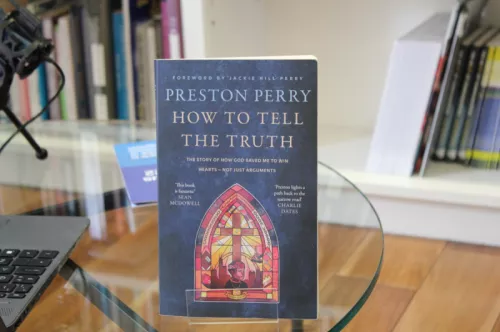The global missional landscape is shifting, and we are increasingly hearing more and more powerful stories of evangelists all over the world experiencing breakthroughs and overcoming great challenges in sharing the gospel in their context. There is much we can learn to help equip the UK church and empower evangelicals to make Jesus known in the UK. This series; Mission Possible, is intended to help us do just that. As the first instalment in the series, US apologist and author of How to Tell the Truth, Preston Perry, shares why we, as Christians, must be willing to share truth with compassion and humility so we can 'win hearts and not just arguments'.
Preston Perry was raised on the south side of Chicago, amidst a culture of crime and an environment far from God, before finding Jesus as a young adult. Now an impassioned evangelist and apologist, he lives in Atlanta with his wife Jackie and their four children. He can be often found on social media documenting his conversations with people from all walks of life in all different contexts; Muslim cab drivers, Mormons in the shopping mall, Jehovah’s Witnesses in his community and those of no-belief on the streets of Georgia. Preston not only demonstrates confidence in his Christian faith but a remarkable amount of knowledge and compassion for those of other faiths and beliefs to find common ground. He is relational in his conversations, asking questions, listening and defending his beliefs by offering biblical truth with compassion. In return, many have come to Christ. In his book, How to Tell the Truth, he impresses Christians with the importance of winning hearts and not just arguments. He says, ‘Just proving someone else is wrong doesn’t automatically prove you’re right. You still have to be able to articulate why your beliefs make sense.’ He urges that to be effective for God’s kingdom, we must not only illuminate His word to others, but also reflect His heart, and says, ‘apologetics ain’t about defeating people. It’s about reaching them.’
Interview questions and answers
Nicola: You say in your book that you were “fascinated to find that in your time in South Africa, Nigeria, Kenya, London, Sweden and a host of other places, people around the world have the same questions that they have in America,” when it comes to sharing faith, one of them being, “how do I share the gospel with unbelievers?” Why do you think we are all grappling with the same question?
Preston: Everybody has the same issues, and everybody has the same sin problems. We have the same sin problems in the States that they have in Africa. But the same God who wants to deliver us in the States wants to deliver us in the UK, so we are all in the same boat.
Nicola: Does being an apologist mean we have to be willing to debate our faith?
Preston: Apologetics simply means the defence of religious doctrine and a lot of times when we think about apologetics, we think it’s about tearing someone’s faith down, but do we know properly how to defend our own faith? And so, learning about your own faith is really already half of the battle… I would challenge people not to think that apologetics is about battling people, it is more about being ready, [the Bible] says in your hearts, honour Christ the Lord as holy. Always be prepared to make a defence to anyone who asks for the reason for the hope that is within you yet do it with gentleness and respect. [1 Peter 3.15]
Nicola: Our Talking Jesus report revealed that 52% of Christians in the UK believe that other believers are better suited to talk to non-Christians about Jesus. You share in your book some of your own early experiences as an evangelist in Chicago and at times having a lack of confidence. Why do you think as Christians, sharing the gospel can be so challenging?
Preston: I think for one, we overcomplicate it. I think people just want to know who is this God? What is He about? I think we overcomplicate evangelism and apologetics and we ignore the fact that God just called normal people.
Nicola: What are some of the questions non-believers ask you when you witness?
Preston: People want to have a good understanding of why God allows evil in the world. I think they need Christians to explain to them that the same God who allows evil in your life, didn’t withhold evil even with His own son and that God is not calling any of us to go through anything that He didn’t go through Himself. I think people have normal questions and I think we are equipped to answer, but I think a lot of times we think we aren’t equipped because we overthink it.

Nicola: One of your missional tools is asking questions, which isn’t necessarily an evangelical’s immediate default setting. What are some of the questions you ask?
Preston: I ask about their lives. I ask them what they think about the Christian church, that tells you a lot. One thing I’ve realised is that people have a lot to say about the Christian church, and asking questions gives information and helps me know how I can share Jesus in a way that they are more likely to receive it.
Nicola: What have some of the responses been?
Preston: I have had people say, “I think the Christian church could be more giving” or “not be so judgemental”. A big part of presenting God to the world is presenting well as the church… We should never be convinced that we gave somebody the truth, but not convinced of how we delivered it. So, if we give the truth in a garbage bag or an undignified platter, they are going to reject the truth because of how we gave it to them… A lot of evangelism is about having emotional intelligence and being sensitive to a person.
Nicola: What about those who are worried they won’t ask the right questions, or have the right answers when sharing their faith with non-believers or those of other faiths?
Preston: I get stumped all the time, but evangelism isn’t just about having the right questions it’s about asking God for help. Theology can only take you so far when you are dealing with human beings. Jesus didn’t just come and quote theology to people… I became a better evangelist because I didn’t give up. I didn’t stop having conversations with people. We don’t become better evangelists because we are so afraid of looking wrong. If you think of 20 years from now, how effective you can be, if you keep having conversations. And lastly, don’t put so much pressure on yourself to always have an answer.
"I get stumped all the time, but evangelism isn’t just about having the right questions it’s about asking God for help."
Nicola: You speak in your book about the fact that evangelism is different for all of us. What do you mean by that?
Preston: God is going to use us all how He uniquely made us. I think when we think about evangelism, we think you have to go out and talk to strangers. Your evangelism doesn’t have to look like mine. God will open doors… evangelism isn’t always about being bold, evangelism is about obedience.
Nicola: What tools can help guide us in conversation?
Preston: I think we do have to be sensitive to the Holy Spirit and ask God for help and be humble. God will give you the things to say if you depend on Him. But if you just go out there with a script, you will start treating people like projects and not image-bearers.




